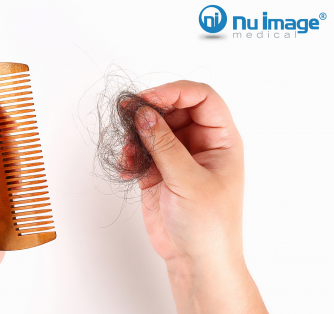Menu
Weight loss
Hormones
Sex
EXPLORE
MEET NU IMAGE MEDICAL
TREATMENTS
MEET NU IMAGE MEDICAL
TREATMENTS
MEET NU IMAGE MEDICAL
4 Major Don't for Thinning Hair


In a quest to feel beautiful, accepted, and confident by the friends you keep and the social structure around you, things like clothes, makeup, and hair are often foremost considerations. While being successful and amassing material wealth can be equally important, people tend to spend more time on the day-to-day approach of impressing those around them. Unfortunately, the body doesn’t always cooperate. Although it seems to be more common in men, thinning hair and balding are just as common among women, equally devastating any attempts to present the best version of one’s self.
Causes of Loss
There are a number of factors affecting how well your hair holds up to the test of time, and stress, poor diet, hormone changes, medications, and genetics are some of the more well-known factors. For some lucky individuals, there is a temporary experience of loss, while others need to pursue long-term treatment plans to deal with their hair loss. There is a lot of information available to those who suffer from thinning or balding concerning ways to improve their growth and retention potential, and the primary piece of advice that is offered deals with seeking help. Hair problems can be embarrassing to deal with and talk about, but fortunately, options abound to help slow down loss, re-grow hair, and boost your appearance. Talking to your general practitioner is a place to start, and they can refer you to a specialist or prescribe a medication or treatment plan based on the severity of your condition. A healthcare professional can help you with what to do, but the following list can help you with what not to do if you are experiencing thinning hair, shedding, or loss.
1. Don’t Be Too Harsh
Don’t take your frustration out on your hair, especially when your hair is already struggling. In general, people tend to be more harsh or rough with their hair as opposed to how they treat their skin, and these conditions make a problem with thinning hair worse. Avoid blow-drying your hair on the highest heat setting close to the scalp and pulling it straight with a comb. If your hair is weak and fine, it is more likely to snap. An alternative would be to dry your hair naturally, gently using a towel to scrunch out moisture. It is okay to use a hairdryer or straightener on the lowest heat setting, but coat your strands with a heat protection product for the best results. Again, avoid brushing your hair through while drying as it tugs too much on the already fragile root. You can brush at the end to help create the style you desire.
2. Don’t Use Too Much Product
Depending on what the latest fashion trends are telling you, the wet look or the slick-and-straight might be demanding too much gel or mousse involvement for thinning hair. When you use too much product, it causes the strands of hair to separate, making your scalp look more thin and sparse than what it may actually be. It is best to use a small amount of mousse prior to blow-drying the hair to help achieve a look. Hairspray does the same thing when it is sprayed too heavily. Not holding the can at least 10-12 inches from your head can help avoid the clumping and exposure of thinned patches of your scalp.
3. Don’t Hide From Your Stylist
Even though you may be worried about criticism or you are embarrassed by your thinning or balding, continue to see your stylist about every six weeks. They can be an ally in choosing a cut or style that works better with what your hair is doing, helping to mask thin areas. You can also use coloring to help fade thinning areas and blend them back into the scalp with less notice. Be careful to not over-expose your hair to harsh chemicals and products.
4. Don’t Starve Your Hair
In an attempt to hide thinning hair, many people will turn their focus to other areas of the body that could create more positive attention, such as weight or muscle tone. Your hair needs a wide range of nutrients to grow healthy and strong, and restrictive diets can be super damaging to healthy hair, let alone hair that is struggling. Hair follicles and cells need protein and calcium to operate at full potential, as well as a mix of vitamins and minerals.
There is no short-cut to healthy hair, and you need to be willing to change out poor habits for good ones if you are going to get control of your hair loss problem. If these options don’t seem to help, there are medications that can help you preserve a head of healthy hair.
Nu Image Medical® offers a new and futuristic approach to achieving optimal health and wellness. The company has been a weight loss, anti-aging and wellness provider since 2004 and offers medically supervised programs for medical weight loss, peptides, erectile dysfunction, scream cream, and hair loss (NuDew)
This article is for informational purposes only and does not constitute medical advice. The information contained herein is not a substitute for and should never be relied upon for professional medical advice. Always talk to your physician about the risks and benefits of any treatment. Nu Image Medical may not offer the medications or services mentioned in this article.
